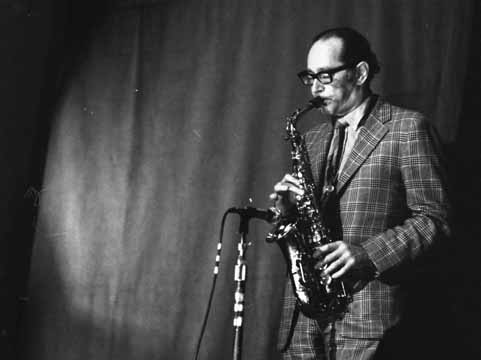
“We were listening to Gene Krupa's band, sometime in 1942," Strack said. “Howard Dulany had just left as the singer. The guy who replaced him had some kind of a convoluted Italian name and they decided that just wasn't going to work for a vocalist. I mean, it was more difficult than Sinatra. So, he changed his name to Johnny Desmond. We were standing there listening to the band and discussing the fact that this had happened, and Paul said, 'Jeesh, you know that's such a great name. It's so smooth and yet it's uncommon.' He said, 'If I decide I need another name, it's going to be Desmond.'"Over the years, when asked where he got the name, he gave a variety of answers, often delivered with his enigmatic grin: from the telephone book, from the union directory, from a newspaper, from a girl friend. He delivered these harmless put-ons with charm, conviction and the ring of sincerity. The telephone-book answer took on a life of its own and is endlessly repeated in stories about Desmond.
Now, a little family history: Because of a condition that indisposed his mother, Paul did part of his growing up in New Rochelle, New York, in the home of his father's brother Frederick Breitenfeld and his family. He became close to his cousins Rick and Ruth. Rick provided much of the research material that went into the Desmond biography. Ruth's married name is Barton. Her son Fred has extensive Broadway, motion picture and cabaret credentials as composer, song writer, orchestrator, director and actor. See his web site for full information and MP3s of some of his work. He never met his famous second cousin, but had one memorable telephone conversation with him when Fred Barton was an 18-year-old majoring in music at Harvard. He writes:
I was visiting my Uncle Rick and Aunt Mary Ellen in December 1976 -- and I had competed to write the music for Harvard's Hasty Pudding show (my life's dream, at the time -- I wasn't thinking big!) -- anyhow, I was rejected and was beyond morose.
Rick and Mary Ellen sent a tape of the songs to Paul, and while I was visiting he called them to chat, and they suddenly put me on the phone with him. We were both a little tongue-tied, since we'd never spoken before, but we had a great chat. Paul told me that my retro-stride songs reminded me of his father.... and he assured me that I would win the competition the next year. Well, I DID win the competition the following year, and I (within the context of being typically Breitenfeldian-atheist) I had to think he was somehow winking at me “I told you so."If only I'd been born earlier, or he'd lived longer, we'd have gotten to know each other in New York. A friend of mine plays at Elaine's Sunday nights -- I'm going to make it a hang-out.
Here is an intriguing sample of Fred Barton's writing. It's called “Psychobirds." Desmond might well have grinned at this.
I wrote “Psychobirds" at USC when I was getting my master's in Film Scoring at USC (I'm happy to announce I won the annual Harry Warren scholarship; I was old-school and retro, of course, so Warren's daughter Cookie Warren went for my stuff. She tragically died with her husband and two grandchildren in a plane crash within a month of the Award ceremony -- I still have a book of her father's songs she gave me, inscribed “YOU'D BETTER MAKE IT! -- Best, Cookie Warren" -- I'm trying, Cookie, I'm trying.....)
I was studying with David Raksin, and for one assignment, he put together a fake “main title" sequence for an imaginary movie called “Psychobirds," based on the style of the Psycho/Vertigo films, with various geometric graphics doing various dramatic things, and part of the idea was to “hit" the main events and titles -- so the piece was written to those hits. We would routinely record with a small ensemble drawn from the USC musicians du jour. Raksin was one of the funniest and smartest people I ever met, and since I'd actually heard of (and seen) “Laura," etc. and knew all of his arcane references from the past, I was something of a teacher's pet. He started out helping Charlie Chaplin in the earliest days -- helping to turn the tune “Smile" into a film score..... (before it was a song.) One of his memorable quotes: “Madonna gives cheap vulgarity a bad name."



























